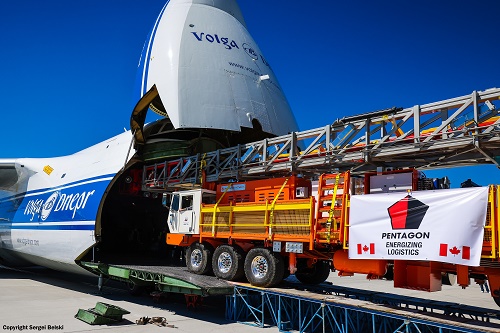Project logistics in Oman is a complex and challenging area. The country has an extensive network of roads and highways, but most of these are not suitable for large-scale projects. As a result, it can be difficult to find the best way to transport materials from one place to another. Fortunately, there are experienced project logistics professionals who understand the unique challenges faced by those working in Oman. In this blog post, we’ll explore the realities of project logistics in Oman, what solutions are available and how you can ensure you get the best results when transporting materials or equipment.
What is Project Logistics?
Project logistics is the coordination and management of all aspects of a project, from inception to completion. It includes the planning and execution of all transportation, warehousing, and other logistics activities required to support the project.
Project logistics can be a complex and challenging undertaking, particularly in developing countries where infrastructure is often lacking. Lack of coordination between different stakeholders can also lead to delays and disruptions.
Oman is a country that has seen considerable development in recent years, with a growing economy and infrastructure. However, it faces some challenges when it comes to project logistics. The Sultanate does not have a deepwater port, which can limit the size and type of vessels that can call at its ports. In addition, there is only a limited rail network, which can make it difficult to transport heavy or oversize loads.
Despite these challenges, Oman has made significant progress in developing its project logistics capabilities. In 2012, the government established the National Logistics Strategy (NLS), which sets out a vision for the development of world-class logistics infrastructure and services in Oman. The NLS has helped to drive investment in key projects such as the construction of new ports and railways.
The Sultanate has also taken steps to improve coordination between different stakeholders involved in project logistics. In 2013, the government launched an online platform that provides information on various aspects of project logistics in Oman, including Customs procedures, freight forwarders, and contact
The Different Types of Project Logistics
There are many different types of project logistics, each with their own unique set of challenges and benefits. Here are some of the most common:
1. Event Logistics
Event logistics refers to the planning and coordination of all aspects of an event, from transportation and accommodation to security and crowd control. Event logistics can be a complex and demanding process, but also provides a great opportunity to showcase your company’s organizational skills.
2. Construction Logistics
Construction logistics deals with the transportation and coordination of construction materials and equipment. It is a critical part of any construction project, as it can often make the difference between a successful project and a failed one. Construction logistics can be particularly challenging in remote or difficult-to-access locations.
3. Oil & Gas Logistics
Oil & gas logistics refers to the transportation and coordination of oil and gas exploration and production activities. It is a critical part of the oil & gas industry, as safe and efficient transportation is essential to ensuring the success of these operations. Oil & gas logistics can be very challenging due to the volatile nature of the commodities being transported.
4. humanitarian Logistics
Humanitarian logistics deals with the transportatioin and coordinationof aid supplies and personnel in response to natural disasters or other emergencies. It is a complex and demanding process, but one that can save lives in dire situations. Humanitarian logistics requires careful planning and coordination in order to be effective.
Pros and Cons of Project Logistics
Assuming that you are looking for a general overview of the pros and cons of project logistics:
Project logistics is the process of organizing, planning, and controlling resources, timelines, and budgets to successfully complete a project. It can be a complex and time-consuming process, but it is essential to the success of any large project.
There are many factors to consider when deciding whether or not to outsource project logistics. Some pros of outsourcing include gaining access to skilled professionals, saving on costs, and reducing project risks. However, there are also some potential downsides to outsourcing, such as losing control over the project, communication difficulties, and cultural differences.
ultimately, the decision of whether or not to outsource project logistics depends on the specific needs and goals of the project. There is no one-size-fits-all answer, but knowing the pros and cons of outsourcing can help you make an informed decision.
What is the Oman Logistics Market?
The Oman logistics market is one of the most important markets in the world. It is responsible for the transportation of goods and materials between different parts of the country. The Oman government has been investing heavily in the development of this sector, which has resulted in a boom in the industry.
There are many different types of logistics companies operating in Oman, each with their own specialties. The most common type of company is the freight forwarder, which helps to move goods from one location to another. There are also customs brokers that help with the clearance of goods through customs, and warehousing companies that provide storage space for goods.
The Oman logistics market is growing rapidly, due to the increasing demand for transportation services. This growth is expected to continue in the future, as Oman continues to develop its infrastructure and economy.
The Different Types of Omani Logistics Companies
The Sultanate of Oman is strategically located at the entrance to the Persian Gulf and is a key player in regional maritime trade. The country’s modern infrastructure and developed transportation sector make it an ideal location for logistics companies.
There are a variety of Omani logistics companies that offer a range of services, from warehousing and distribution to transportation and supply chain management. These companies have the experience and resources to support businesses of all sizes with their logistical needs.
Some of the leading Omani logistics companies include:
Oman Air Cargo: Oman Air Cargo is the national carrier of Oman and offers a range of airfreight services. The company has a modern fleet of aircraft and a network of offices across the globe.
Oman Logistics Center: The Oman Logistics Center is a government-owned company that provides comprehensive logistics solutions. The company has a focus on quality and customer service, and offers competitive rates.
Muscat Express Transport: Muscat Express Transport is one of the leading transportation companies in Oman. The company offers a wide range of services, including road transport, warehousing, and distribution.
The Future of Project Logistics in Oman
The Sultanate of Oman is strategically located at the southeastern corner of the Arabian Peninsula. It has a long coastline along the Arabian Sea and is bordered by the United Arab Emirates (UAE) to the northwest, Saudi Arabia to the west, and Yemen to the southwest. Oman also controls two major island groups in the Arabian Sea, the Musandam Peninsula and the Daymaniyat Islands.
The country covers an area of 309,500 square kilometers and has a population of 4.6 million people. The capital city is Muscat, which is also the largest city. Other major cities include Salalah, Sohar, and Nizwa.
The official language is Arabic but English is widely spoken. Islam is the dominant religion and Muslims make up around 75% of the population. The currency is Omani Rial (OMR).
Oman has a stable economy and a strong relationship with Western countries. It is a member of the Gulf Cooperation Council (GCC) and has close ties with Saudi Arabia, Kuwait, Qatar, Bahrain, and UAE. The government has been investing heavily in infrastructure development in recent years.
Project logistics refers to the coordination and management of all aspects of a project including transportation, warehousing, customs clearance, etc. It is a crucial part of any construction or engineering project as it ensures that all materials and equipment are delivered on time and within budget.
Oman has seen rapid economic development in recent
Conclusion
In conclusion, project logistics in Oman has become an important factor for a successful venture. By utilizing the services of experienced logistics companies or personnel, businesses can ensure their projects progress smoothly and efficiently. This helps to maximize resources, lower costs and ultimately provide customers with a great experience – all while helping to further grow the economy of Oman.


 Unlock Your Path to Beauty, Wellness & Success
Unlock Your Path to Beauty, Wellness & Success  Pravi Celer: The Real Celery Explained with Benefits, Uses, and Nutrition Facts
Pravi Celer: The Real Celery Explained with Benefits, Uses, and Nutrition Facts  Pragmatic Juara100.org Medal: Everything You Need to Know
Pragmatic Juara100.org Medal: Everything You Need to Know  Understanding repmold: The Future of Sustainable Manufacturing
Understanding repmold: The Future of Sustainable Manufacturing  Rowdy Oxford Integris: Pioneering a New Era in Education and Innovation in 2025
Rowdy Oxford Integris: Pioneering a New Era in Education and Innovation in 2025  EO Pis: The Modern Framework for Executive Performance Insights
EO Pis: The Modern Framework for Executive Performance Insights